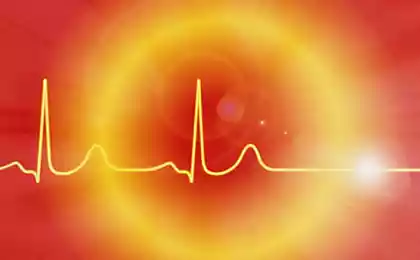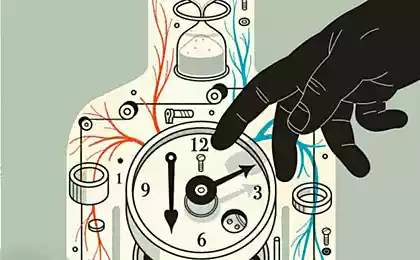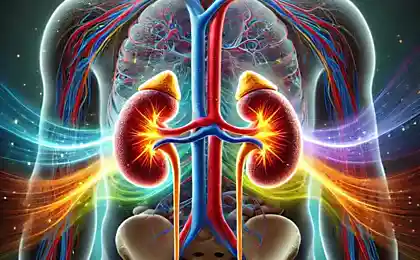796
The one and only cause of Your constant fatigue
We know how to fix it!
February 13, 1972, Michel Sifr climbed into a cave in southwest Texas. The following six months he spent in her, never in these days without seeing the light of day.
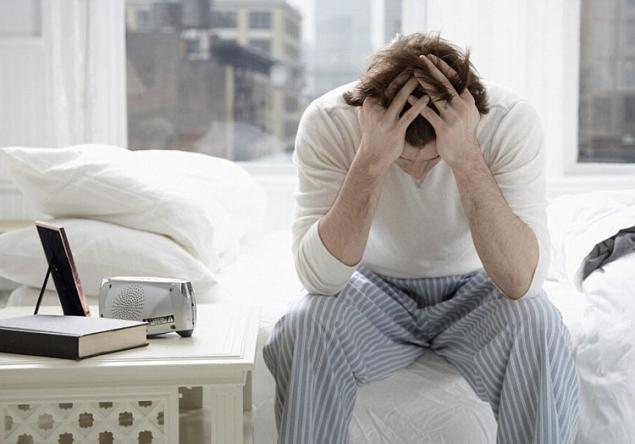
Sifr was not crazy, and the French scientist and pioneer in the field of chronobiology — the science that studies the biological rhythms. The most famous rhythm — circadian, it regulates the cycles of sleep and wakefulness. Sifr climbed into the cave to figure out how this mechanism works.
Sifr lived in a tent. The role of the bed, he had completed a wooden pallet. Was he also the Desk, chair and telephone for communication with a research group that remained outside.
In his underground was one light that always lights the same soft light, a large supply of frozen food and a couple of tons of water. And most importantly: it or him there were no clocks and calendars. His task was to monitor the body, which knows not day or night, and to sleep in him or not.
So alone in this cave Sifr lived for six months.
All the while he tried to figure out how to operate his biological clock. Here's what he wrote in his diary:
"I finally got the perfect dream! Now my body chooses when to sleep and when to eat. This is very important. We've learned that in day 24 hours. But the internal clock of our body give the night a little more than 24 hours and 30 minutes."
Sifr and then put on all new experiments. And found the perfect formula in a 48-hour cycle: 36 hours of continuous wakefulness, and then 12 hours of sleep.
Work Siffre and his followers were forced to become interested in the nature of sleep scientists of the largest universities of Harvard and Pennsylvania.
Given the fact that a third of your life sleeping, it is hard to believe that this topic became seriously interested scientists only in the last decade.
Let's get started.
How much sleep do you need?
To answer this question, let us consider the experiment conducted by researchers from the University of Pennsylvania and professionals from the University of Washington.
They collected 48 healthy men and woman who slept an average of 7-8 hours a day. Then they were divided into four groups.
The first group of volunteers, who were deprived of sleep for three days in a row. The second group — those who slept a day in just four hours. The third group is the people who slept 6 hours per night. Finally, the fourth group had to sleep for 8 hours — no more, no less.
The experiment lasted for two weeks. And then all respondents have passed tests for mental and physical performance.
That's what happened.
Those who slept for 8 hours a day was "cucumber" and took tests as well as before the start of the experiment.
Meanwhile, those who slept for 4-6 hours showed a steady decline in cognitive abilities, and the problems grew with each passing day. More importantly, between members of groups "4" and "6" no significant difference was not.
Scientists also found that the need for sleep can accumulate.
After a week one in four of those groups that have enough sleep, started involuntarily "pass out" in random places.
After two weeks of the experiment, the members of the group that slept only 6 hours, showed the same lack of productivity as those who did not sleep for two days straight.
Let me repeat: if you sleep only six hours a day for two weeks straight, your mental and physical abilities decrease to the level as if you were awake for 48 hours straight.
The second important remark: the participants of the experiment did not notice that they reduced performance.
When the experiment participants were given the opportunity to evaluate its effectiveness, all of them, as it turned out, was overrated.
In other words, we are not able to adequately assess themselves and their productivity. So, we may think that chronic lack of sleep — this is normal. Or even that we don't need all 8 hours. But it's not.
We live his life in the bright offices, lead social conversations and consumed huge amounts of caffeine. Ie we have a plenty of tools that allow us to feel awake, when in fact all serious.
The cost of lack of sleep.
The irony is that many of us consciously deprive themselves of sleep in order to enhance their productivity, in order to accomplish more. But really, we only harm their plans.
In the United States alone, studies show that chronic lack of sleep of workers leads to the fact that their employers lose a total of $100 billion a year due to the fact that employees regularly enough sleep.
Gregory Belenky, Director of the research center for the study of productivity at the University of Washington, explains:
"If you are doing work that does not require from you any mental skills that depriving yourself of sleep, you are trading time awake at the expense of productivity".
This brings us to an important question: how do you know you have enough sleep or not? A wide range of studies have shown that, as a rule, for 99% of people on the planet need seven and a half or eight hours. If we speak about the optimal values.
Experts agree that 95% of adults in order to live a normal life, have to sleep every night from 7 to 9 o'clock. If they will sleep less, you will start to lose their mental and physical performance. Children and the elderly tend to sleep even more.
Meanwhile, people are sleeping less and less. At Harvard medical school say that the average sleep duration of Americans has decreased from 9 hours in 1910 to 7 hours today.
Dr. Lawrence Epstein from the Institute claims that 20% of Americans and is sleeping less than six hours a day.
How to sleep.
A process called the cycle of sleep and wakefulness, determines the quality of your sleep.
It has two stages:
1. The slow-wave sleep (deep sleep)
2. REM sleep (when we dream and when we Wake up).
During NREM sleep the body relaxes, breathing becomes slow and deep, the blood pressure falls, the body becomes less responsive to external stimuli. Wake up hard.
This step is critical for recovery and repair of the body. During slow sleep the pituitary gland actively secretes hormones growth. They stimulate tissue growth and muscle repair.
The researchers also believe that the immune system of the body also get the opportunity to rest during this stage.
This dream is especially important if you're an athlete. It is known that before an important competition, LeBron James and Roger Federer sleep for 11-12 hours a day.
And for good reason. Researchers from Stanford University have shown that basketball players who sleep more than 10 hours a day, giving the best results in accuracy of shots and speed of response to unexpected situations.
Usually basketball, sleep for 8 hours a day. But if you give them to sleep ten hours, then the accuracy of three-pointers increases by 9%, and in the sprint on 80 meters they are faster than 0.6 seconds faster than usual. That's a lot. And all because the slow-wave sleep helps us to recover faster your muscles.
Now let's talk about slow-wave sleep. At this time, your brain creates dreams and reorganizes information, sistematizirovat her. At this time, also a fast-growing neurons. So in the morning you have a better working memory, and in the morning it's easier to learn. During REM sleep heart rate, blood pressure and body temperature, on the contrary, increase. Such a FAS, you should have three to five a day.
If you deprive yourself of any of these two phases of sleep, your body literally begins to die. If you experience lack of sleep, it cannot repair itself physically. Your immune system weakens, the mind becomes hazy. You have an increased risk of Contracting a viral infection. You gain weight, you begins to develop diabetes, pressure problems. A little more and you will learn what heart disease, mental illness and early mortality.
Summary conclusion: REM sleep you need for physical recovery, quick — mental. Because your sleep quality deteriorates with age, in order to stay longer young, need to sleep more.
Age-related changes
Harvard medical school says that the older you are, the harder you sleep. And the worse your sleep to cope with its functions.
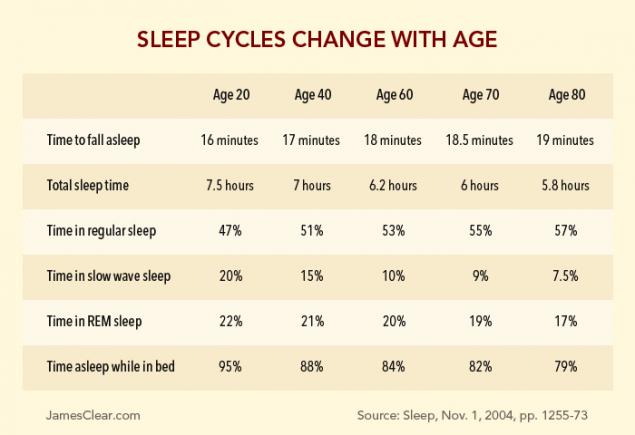
Based on the above data, we can say that the average 80-year-old man receives a whopping 62 percent less slow sleep than the average 20-year-old boy.
And this is one reason why adult people age so quickly tissue cells. If the elderly have problems sleeping, you can be sure that the process of aging are now quickly accelerating. And need to seek help to sleep.
There is no doubt that a good and healthy sleep — the guarantee of protection from premature aging.
How to recover if you enough sleep.
Experts from Harvard medical school give only one recommendation: the need to sleep during the day. At least a little: 20-30 minutes. This will be enough to help your brain "think".
When you need to go to sleep and when to Wake up.
As you already know, the cycles of sleep and wakefulness called the circadian rhythm. It determines when you need to sleep.
But some common points:
- At 6 a.m. cortisol levels increase, which helps to Wake up your brain and body.
- At 7 a.m., the body stops producing the sleep hormone melatonin.
At 9 am your sex hormones are at their peak performance.
- 10 a.m. - the peak of your mental activity.
- 2.30 day - rush for your system, which is responsible for motor skills and coordination.
- 3.30 PM - the time when you have the best reaction time.
- 5.00 day - a time when it's best to work your cardiovascular and muscular system.
- 7 PM - time high blood pressure and elevated body temperature.
- 9pm - the start time of the production of melatonin. The body prepares the body for sleep.
- 10 PM. You often want to use the toilet. The body continues to get ready for bed.
- 2 am. The time of deepest sleep.
- 4 in the morning. A time when you have the lowest temperature of the body. The Wake at this time is especially harmful.
Obviously, all these periods can for different people slightly different. But the overall picture they display.
As nulled?
Circadian rhythms change depending on how you behaved and what people are doing during the day. How to reset these "watch" and run them again? The easiest and most proven way: within 30 minutes to look at bright light. Ie you can spend half an hour outside on a Sunny day without sunglasses. Even better — to Wake up at dawn and spend the morning on the balcony.
How to sleep correctly. Several of the recommendations.
Here are some practical recommendations.
Avoid caffeine.
If you have any trouble falling asleep, eliminate caffeine from your diet.
If you indulge in a morning Cup of coffee, you are not able to, then don't drink it at least after noon.
Quit Smoking.
The bedroom is the room only for sleep and sex.
Spend a lot of time in the bedroom? See it on the TV? This is your main mistake.
Remove from the bedroom all distractions: TV, laptop, tablet, smartphone. And again, the curtains should be dense. So tight that night in this room was in absolute darkness.
Exercises.
If you can not sleep, try to do light exercises after returning home from work. This will help your body and brain faster disconnect.
Doing exercises at least two to three hours before bedtime. Otherwise, you'll only hurt yourself.
Temperature.
Most people sleep best in a cool room. The ideal range is 18-21 degrees Celsius.
Sounds.
Perfect silence is best. But if you can't drown out the sounds of the street, use white noise. You can turn an ordinary fan or to install a special application on the smartphone. Another good option — earplugs.
Alcohol.
It's a slippery slope. Yes, many people drink before bed helps to shut down. But alcohol reduces sleep quality and delays the phase of "rapid" sleep. As a result, your brain is resting, but the body is not. That's why in the morning you often Wake up completely overwhelmed.
Stick to a regular bedtime.
The body loves rituals. The circadian rhythm is the basis of our everyday life. Go to bed and Wake up at the same time on weekdays and weekends.
Develop a bedtime ritual.
Avoid the light from the screens of computers, TVs and mobile gadgets before bedtime. The blue light they emit suppresses the process of developing in the body melatonin. As a result, you can't sleep, and your brain every time you are in bed, rides in a circle of unpleasant thoughts. Along the way, instead of melatonin the body produces the stress hormone cortisol — and he is the main enemy of your sleep.
So before bedtime, start as simple as reading a book. It's the perfect way to prepare yourself for a night's rest.
Another option is to download the app F. lux, which in the evening reduces the brightness of your monitor and takes away as possible from the spectrum blue.
You must have a technique for relaxation.
Researchers believe that at least 50% of cases of insomnia caused by stress. Find a way to deal with it every day.
Checked working methods such as reading logs, deep breathing exercises, meditation, exercise and journaling (there's no need to write about what you're grateful for every day).
How to get more energy in the morning.
Drink a large glass of water early in the morning.
Your body was no inflow of water for six to eight hours. That's why you feel so lethargic. Almost always the whole point of dehydration. The first thing I do when I Wake up — drink a large glass of water.
Start the day with sunlight.
Sunlight is a new coffee. If early in the morning to be on the balcony or at the window (on the side where the sun rises) and hold there for a few minutes, it will Wake you up instantly. And ask your brain the right mindset for the day.
Coffee is a way to Wake up on cloudy days and in winter when you have to get up before sunrise. The rest of the time it is better not to drink.
In General, what we all this?
The shortage of sleep, and especially if it is chronic, is the same robber who robs you of performance, intelligence, physical health and good mood.
Our culture undervalues the importance of a good night's sleep. So try to sleep more. Sounds simple, right? How about you try it? published
P. S. And remember, only by changing their consumption - together we change the world! ©
Source: lifter.com.ua/Odnaedinstvennaya-prichina-vashey-postoyannoy-ustalosti
Elysia chlorotica: half animal and half plant
Canon has announced a camera that can shoot video in almost total darkness
